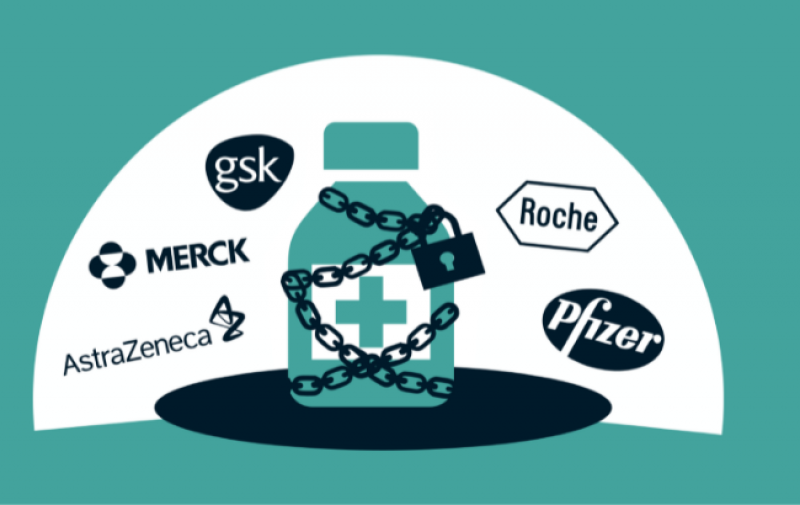
New Covid medicines: EU about to repeat mistakes from vaccines strategy
As the EU rolls out its 'Therapeutics Strategy' for a range of new COVID-19 treatments, it fails to do what's needed to make these life-saving medicines accessible and affordable for the world's poorest. The EU is repeating the same mistakes it made with COVID vaccines, which remain out of reach for the large majority in low-income countries. This is the conclusion of new research by Corporate Europe Observatory (CEO) 'Bitter pill: How the EU's defence of pharma profits could keep COVID treatments out of reach for millions'.
On 6 May 2021, the Commission launched its Strategy on COVID-19 Therapeutics as a complement to its June 2020 vaccines strategy, calling it a "reinforced and strategic approach" to the development, manufacturing, and procurement of safe and effective COVID-19 therapeutics at EU-level.
In the run up to the World Trade Organisation summit in early December, negotiations over a waiver of patents on COVID-19 medical products are entering a crucial stage. Without a patent waiver and technology transfer the world's poorest people will be priced out. Unfortunately the EU's policies for getting these medicines on the market – the Therapeutics Strategy – does not offer any credible solution.
Olivier Hoedeman, Researcher at Corporate Europe Observatory said: "While the COVID pandemic is still raging all over the world, the EU has betrayed the global south, where most people still do not have access to vaccines nearly one year after rich countries started vaccinating their citizens. The TRIPS waiver on patents, so far blocked by the EU, remains badly needed for scaling up production of vaccines and to get the world out of this pandemic."
"The TRIPS waiver being discussed early December at the WTO ministerial meeting is also crucial for ensuring that the new COVID medicines now entering the market are affordable and thus accessible for everyone. In the first months of the pandemic European politicians promised that the vaccines would become "a global common good''. We no longer hear this, because they know just how hollow this promise was."
"Unfortunately the EU seems to be obsessed by protecting the commercial interests and market positions of Big Pharma, advocating charity instead of forcing pharmaceutical companies to share their technology and know-how - largely publicly financed - and allowing generic producers to make the new covid therapeutics more affordable and available for the world's poorest."
ENDS
Notes to the editor:
- Next week the European Parliament plenary meeting will discuss both the WTO ministerial meeting and the "Pharmaceutical Strategy for Europe": Final draft agenda - Index - Monday, 22 November 2021 - Thursday, 25 November 2021
- The 12th Ministerial Conference (MC12) will take place from 30 November to 3 December 2021 in Geneva, Switzerland: WTO | Ministerial conferences - Twelfth WTO Ministerial Conference - Geneva Switzerland
- The WTO is regarded as the last chance to find agreement on a temporary TRIPS waiver as proposed by South Africa and India in October 2020, which would set aside patent protections for COVID-19 vaccines and treatments for the duration of the pandemic. Nearly 160 low- and middle-income countries joined or supported the proposal, and some high-income countries eventually backed it, including US President Joe Biden who backed the waiver for vaccines.
- The European Union remains in full opposition of the waiver, asserting in its own counter-proposal that existing flexibilities in the TRIPS agreement and voluntary actions by pharmaceutical corporations are enough to address access concerns globally. In order to overcome the outsized influence pharmaceutical corporations have over who has access to treatments as they become available, the EU must change its position and support the waiver proposal.For a clear explanation why the EU proposals as alternative to the Trips waiver are meaningless listen to Dimitri Eynikel, an expert with Médecins Sans Frontières (MSF) here: An EU love affair with Big Pharma | Corporate Europe Observatory
- Although rates of people fully vaccinated in high-income country are reaching and passing 80 per cent, only 2.3 per cent of people in low-income countries have received at least one dose, leaving hundreds of millions of people vulnerable to death and long-term complications of COVID-19.
- Obliging the pharmaceutical companies to share intellectual property as part of the EU's vaccine deals would clearly have been the right thing to do. In fact it was part of the stated objectives in the agreement between the EU member states and the Commission in mid-June 2020 on the joint procurement of vaccines. This agreement states that "the Commission will promote a Covid-19 vaccine as a global public good. This promotion will include access for low and middle income countries to these vaccines in sufficient quantity and at low prices. The Commission will seek to promote related questions with the pharmaceutical industry regarding intellectual property sharing, especially when such IP has been developed with public support." (See : Agreement Between the Commission and Member States on Procuring COVID19 Vaccines on behalf of the Member States and Related Procedures, page 45-51 of the CureVac contract.)
- If pharmaceutical corporations are to meaningfully contribute to equitable global access to COVID-19 therapeutics, they must commit to fully sharing their intellectual property with platforms such as the MPP, the Open COVID Pledge, or the WHO's COVID-Technologies Access Pool (C-TAP). Companies should also be transparent about their production capacity, stock, and ability to meet demand, which would assist procurement agencies and organisations such as MSF to better plan their responses across the globe, especially in middle- and low-income countries.
- Our review of the situation with COVID-19 therapeutics is correct at time of publication. Please note that this is a fast-changing field with new therapeutics entering the market and new announcements about licensing announced every few days.
